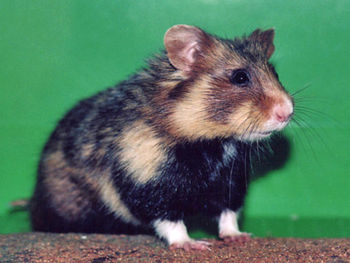Watch out for symptoms that may indicate your hamster has an illness. The first key to maintaining proper hamster health is to make sure that her environment is always dry and clean. When cleaning the living area, be sure to clean any spills or other mess.
Humans do not have to worry about most of the diseases found in hamsters. Zoonotic diseases refer to a disease that can be transferred from an animal to a human. Two common examples of a zoonotic disease are salmonella and ringworm. Before and after you handle your hamster, be sure to wash your hands since this is a great way to prevent the transfer of any such disease. Once your hamster is diagnosed with a zoonotic disease, you will be given additional instructions on how to make sure it does not spread.
 |
| Hamster Commun (Photo credit: Wikipedia) |
Hamsters who live alone are less likely to catch a disease than those who are kept with several other hamsters. Also, use care when introducing any new hamster to your existing pets. You may not notice right away that your hamster has a disease, even though they may look healthy to you.
Although your hamster does not require an annual wellness examination, it is still recommended that you find a qualified vet before there is truly an emergency. Ask around to see if anyone know of a vet who specializes in treating exotic animals, like your hamster. For future reference, you should also ask them how much they charge for various services.
Hamster can catch diseases, they can be injured, and catch other illness as a result of poor house cleaning. Be on the lookout for these common things:
Abscesses
Fighting with another hamster can result in a wound that gets infected and causes an abscess. To treat the abscess, you can drain it and then apply treatment, but this is quite painful for your hamster and should be avoided. The best way to deal with an abscess is to just make an appointment with your vet.
Colds/Pneumonia
If you notice any type of wheezing, difficulty breathing, or eyes glues shut, you need to take your hamster to the vet clinic immediately. You may also notice things like weight loss, a discharge from the hamster's nose, and general lethargy.
Tyzzer's Disease in Pet Hamsters
Tyzzer's Disease is a very contagious disease that spreads from hamster to hamster, and usually results in death. Some hamsters will show no obvious signs of the disease before they die. Others will show symptoms like a lack of activity, a scruffy-looking coat, diarrhea and dehydration. The disease is quite common among hamsters who live in an unclean environment, and hamsters who are under plenty of stress. Fortunately, it is rare in animals with clean housing and who are well-cared-for.
Diabetes
This is a disease that has been encountered in Campbell's Russian hamsters. A hamster who has diabetes will use suffer from excessive thirst and frequent urination. Changing the diet is usually the extent of treatment. Diabetic hamsters should not be given fruit. You may also want to limit, or completely remove, peas and corn from their food. An accurate diagnosis can be done by a qualified vet, and they can also give you recommendations on how to take care of your hamster.
Winter White hamsters have been found to have glaucoma. There is no cure for hamster glaucoma, but your vet can give you some eye drops to relieve the discomfort for your hamster.
Trouble With the Cheek Pouch
The pouches in the cheek that are used in food storage and transportation can become pierced, impacted or damaged. Symptoms include being unable to empty the pouches or having an everted cheek pouch (one that is turned inside out). Take your hamster to the vet as soon as you suspect that she may have a cheek pouch injury.
Andrew Martin Jr. is a pet hamster enthusiast. Visit Hamster Care Answers for more information on Source: www.isnare.com Permanent Link: https://www.isnare.com/?aid=355045&ca=Pets |


No comments:
Post a Comment